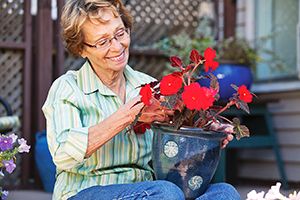Right at Home Safety Tips and Warning Signs for Seniors During Hot Summer Temperatures
Right at Home Safety Tips In Hot Summer Temperatures
 Did you know that there are over 600 heat related deaths in the US each year? Greater than 40% of those deaths are attributed to those who are 65 or older!
Did you know that there are over 600 heat related deaths in the US each year? Greater than 40% of those deaths are attributed to those who are 65 or older!
How hot is TOO hot? Temperatures over 90 degrees can begin to have a negative affect on those who are living out their golden years. Those on a fixed income are often the most susceptible as resources to pay for air conditioners and the electric bills that follow are limited.
In this time of “super-sized” meals and drinks it is hard to believe that anyone might not drink enough. A recent study stated that 93% of men and 83% of women over the age of 71 did not drink enough fluids to keep their bodies hydrated. As little as a 2-3% decrease in volume of bodily fluid is enough to begin to cause physical and cognitive impairment
What about overheating and dehydration?
The causes vary as widely as the people who suffer.
- As we age our bodies change – aging kidneys or those experiencing kidney problems may find it difficult to conserve needed water.
- Medications affect water retention.Some medications cause us to sweat, others are taken to remove water from the body because of heart of kidney concerns. You still need to drink! You can lose too much water!
- Our sense of thirst decreases as we age.Additionally, those suffering from dementia or other cognitive concerns may forget to drink enough water or even to eat.Did you know much of our water intake comes from the food that we eat?
- Mobility issues for some may make it hard to get to a cool drink; or it may just hurt too much to seem worth it to get up and get it.
- The lack of availability of air conditioning or the fear of the coming electric bill is a major concern for some.
- High humidity makes it harder to breath.Not only does your body have to work harder and use more resources to breathe but sweat does not evaporate as it would in dryer weather – locking the moisture in on our skin and making us feel even worse.
- Lack of circulation can cause seniors feel cold even when it is too warm.This is why you will often see a senior wearing a jacket or sweater in very warm weather.
- Illnesses such as a stomach bug with vomiting or diarrhea can dehydrate a vulnerable senior in a day or two.
What can you do to cool down?
- Use the air conditioning!If air conditioning is not available or if utilities are a serious concern take the opportunity to venture out.See a movie.Take a leisurely walk at the mall or visit a senior center to cool off.Perhaps you could go to the library and read.Yes, you can use a fan but pushing 90-degree air around will not be much help.
- Try wearing loose fitting, light colored clothing.Dark colors can hold the heat in.Save them for cooler days.
- Try to stay indoors between 10 A.M. and 6 P.M. when temperatures are at their peak and the sun at its brightest.
- If you can, take a tepid shower – not too hot and not cold.This temperature will not shock the body and will allow water to evaporate and cool you down.
- If taking a shower is too difficult or time consuming apply cool cloths to the wrists, neck, armpits, groin.The blood is closer to the surface in these areas.You will feel cooler very quickly.
- Don’t turn on the stove or oven if you don’t have to. Make a sandwich, have some fruit, or use the microwave to prepare something to eat. But do eat.Remember much of our fluid intake comes from the foods we eat.
- Enjoy high fluid foods such as fruit, soup, broth, vegetables or smoothies which can provide necessary fluid as well as nourishment.
- Drink water or clear juices even if you do not feel thirsty.While a cold soda, coffee or beer may seem like a good idea caffeinated or alcoholic beverages can leave you dehydrated.
- Remember to try to stay inside on high humidity days.Sweat does not evaporate making it more difficult for the body to cool itself. Watch your local weather for information on the humidity in your area.
- If you must go out wear a wide brimmed hat and sunglasses and sunscreen.This is especially important for those with light colored hair or those gentlemen whose full head of hair is but a distant memory. The hat and the sunscreen will protect the skin and the sunglasses may prevent further damage or irritation to precious eyesight.
Warning Signs: Some warning signs of being overheated and or dehydrated can be muscle cramps, confusion, dizziness, inability to sweat, dry or flushed skin, heavy breathing or a rapid pulse, fainting, or signs of dehydration.
Dehydrated or Not?: One such test is the pinch test. Gently pinch up and pull away skin from the back of the hand. If the skin returns almost immediately to its normal position, congratulations you are hydrated. If skin returns to normal very slowly it may be a sign to sit, rest, and have a cool drink of water.
Symptoms of Heat Exposure: These symptoms can lead to serious outcomes. Seniors and others who are experiencing symptoms of overheating or dehydration should consider seeking medical attention. It is important to note that both too much retained fluid and not enough fluid can be equally dangerous. If you have concerns, please speak to your medical professional about what is right for you in your specific situation.



